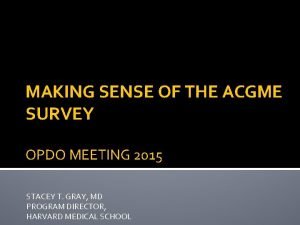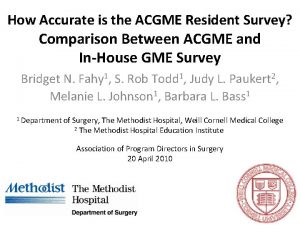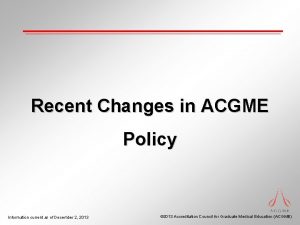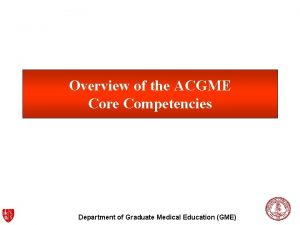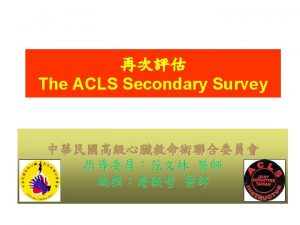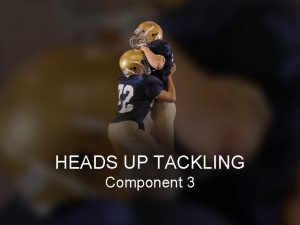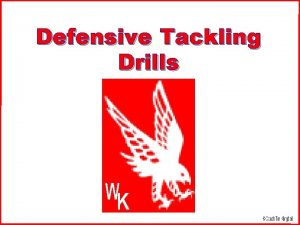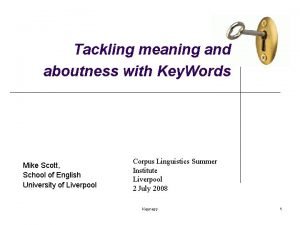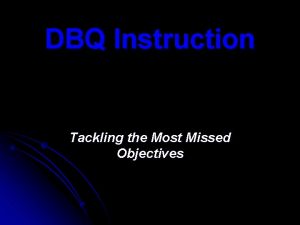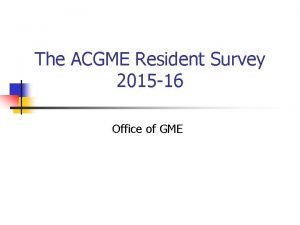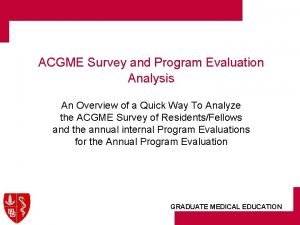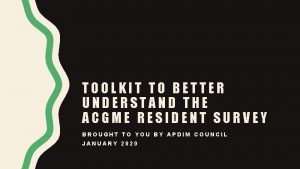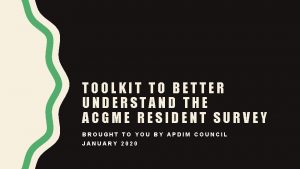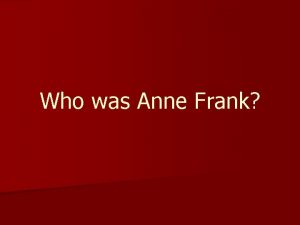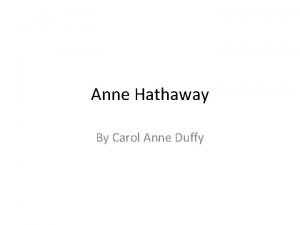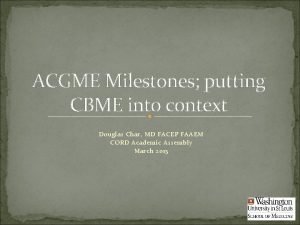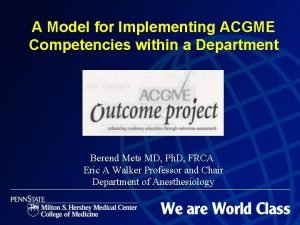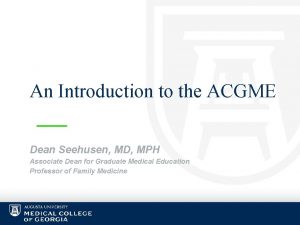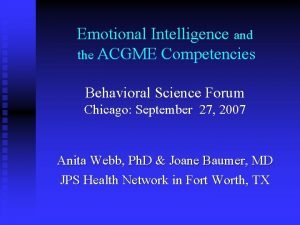TACKLING THE ACGME SURVEY Anne L Champeaux M













































- Slides: 45

TACKLING THE ACGME SURVEY Anne L. Champeaux, M. D Associate Professor of Pathology & Cell Biology, Morsani College of Medicine Pathology Residency Program Director University of South Florida, Tampa FL

Disclaimer • I’m a program director (15 years experience) • I am not speaking on behalf of the ACGME nor any of its Residency Review Committees • The following material is to assist programs in navigating, not ensuring, a successful Annual ACGME Resident and Faculty Survey • No financial disclosures • It is what it is……. .

ACGME Survey • ANNUAL ANONYMOUS REQUIRED survey rendered by the ACGME to all residents/fellows and CORE faculty (January. June) • “Additional method” used to monitor GME and provide early warning of potential noncompliance with ACGME accreditation standards

Next Accreditation System (NAS) • Programs are accredited ANNUALLY (continuous accreditation) – No more 3, 4, or 5 year cycles – No more Program Information File (PIF) • RRCs ANNUALLY look at program data

What Data is Reviewed? • All Data in WEB ADS (ACGME data base) – # residents, #faculty, changes in numbers, PD – Scholarly activity – Response to questions (safety, QI, supervision, duty hours, responses to previous citations) • ACGME case logs • ACGME faculty and resident survey data • Board pass rate and % of residents/fellows who took the boards

Few notes • SAME survey distributed to ALL programs (not specialty specific) – Does create some issues how various questions are interpreted – Practice Habits – Pathology RRC started to “ignore” this questions as majority of ALL pathology programs are “flagged”


ACGME Faculty and Resident/Fellow Survey • Two components – COMPLIANCE • Resident: 70% completion rate • Faculty 60% completion rate – SURVEY RESULTS • Program mean, trends year to year within program • Program mean vs. national mean

Just a little more information…. – Resident Survey Reports – When at least 70% of a program’s residents/fellows have completed the survey and at least 4 residents/fellows have responded, reports will be available annually. For those programs with less than 4 residents/fellows who meet the 70% compliance rate, reports will only be available on an aggregated basis after at least 3 years of survey reporting has taken place. – Faculty Survey Reports – When at least 60% of a program’s faculty members have completed the survey and at least 3 faculty members have responded, reports will be available annually. For those programs with less than 3 faculty members scheduled to participate who meet the 60% compliance rate, reports will only be available on an aggregated basis after at least 3 years of survey reporting has taken place.

Need to know who is getting the survey…. . • Residents/Fellows – CAN adjust for residents on LOA • Faculty – Physicians only – CORE – Program Director

Core Faculty Check • Do this ANNUALLY – Faculty come/go, roles change • Core vs. Non-Core • ACGME survey distributed to CORE faculty, physicians • Need to balance – Competency and teaching abilities/capabilities – Compliance with evaluations/SURVEY – Scholarly Activity – RRC requirements

In case you forget…on the website… • Who will be scheduled to complete the survey? • Not all faculty members will be scheduled to complete the survey. Physician faculty members will be surveyed based on their level of involvement in the program. The program director will always be surveyed. Non-Physician faculty members (as indicated on your program's faculty roster) will NOT be surveyed. Ensure your faculty members’ information is up to date on the Faculty tab within the Accreditation Data System (ADS).

How hard can it be to get to 6070%? ? ? • Does take some effort • USF has had a program in prior years with failure to comply with completion rate • Failure is worthy of program citation

TACKLING COMPLETION • Programs receive EMAIL notification of survey window • It is the PROGRAM’s responsibility to notify residents, fellows, faculty • • Dr. Anne Champeaux, The following program has been scheduled to complete the ACGME Faculty Survey: Pathology-anatomic and clinical program, University of South Florida Morsani Program - [3001131078] Survey begins: March 9, 2015 Survey deadline: April 12, 2015 at 11: 59 pm CST Scheduled faculty: 29 Required response rate: 60% (programs with fewer than three scheduled faculty must obtain 100%) • Programs are responsible for notifying and reminding faculty members. The ACGME DOES NOT contact survey takers directly. To view the faculty members that are scheduled in your program, log into the Accreditation Data System (ADS). Click the "Overview" tab and locate the "Faculty Survey" section. Click "View" to access your list of scheduled survey takers and their default login information ( only accessible during your survey window). •

Tips and Tricks • Communication, communication… – Emails: Use READ RECIEPT. May have to knock on doors for those folks who “don’t read email” • Make it a competition. – First to 100% gets……. • SET TIME ASIDE • Use of part of department meeting, resident didactic time, work into clinic schedule • Make adjustments in Web-ADS if necessary BEFORE window starts (residents on LOA, sabbaticals, legitimate adjustments) • Monitor compliance

• Dr. Anne Champeaux, • This is a reminder that the following program has been scheduled to complete the ACGME Faculty Survey: • Pathology-anatomic and clinical program, University of South Florida Morsani Program - [3001131078] • Survey begins: March 9, 2015 • Survey deadline: April 12, 2015 at 11: 59 pm CST • Current response rate: 51. 0% - [15] completed of [29] scheduled • Required response rate: 60% (programs with fewer than three scheduled faculty must obtain 100%) • Programs are responsible for notifying and reminding faculty members. The ACGME DOES NOT contact survey takers directly.

Don’t…. • Single out folks – ACGME lists assigned pending surveys • Use non-compliance for negative feedback (evaluations, milestones, disciplinary actions) • Assume your coordinator will take care of this – PROGRAM DIRECTOR RESPONSIBILITY • Remember: Make completion of the survey into a POSITIVE experience

MONITOR COMPLIANCE AS A PROGRAM QUALITY INDICATOR • Ensure compliance rate is reviewed and discussed as part of the ANNUAL PROGRAM REVIEW

ANNUAL PROGRAM REVIEW • PROGRAM QUALITY***** – SURVEY COMPLIANCE RESIDENTS – SURVEY RESULTS • RESIDENT PERFORMANCE • FACULTY DEVELOPMENT******* – SURVEY COMPLIANCE FACULTY – SURVEY RESULTS • GRADUATE PERFORMANCE

Winding up the survey…. • Thank residents and faculty for participation • Positive buy-in (Use the survey to show the ACGME how fantastic the program is…rather than how many problems the program has…. ) – EVERY PROGRAM HAS PROBLEMS AND AREAS FOR IMPROVEMENT


PRE-SURVEY “INSTRUCTIONAL COACHING” Coaching…NOT COAXING. It can’t hurt. I may not help. Sit personally (if you can) with residents and faculty You can’t tell them HOW to answer the question, but you CAN explain HOW your program accomplishes the intent of the question • No longer have sample survey • • – Use last year survey – Use categories from ACGME website – Use glossary of terms • Make a “cheat sheet” • Distribute scholarly activity and QI activities

SURVEY CONTENT • DUTY HOURS – go over definitions, show new innovation data • FACULTY EVALUATION- go over your evaluations (when, how many, what evaluations are ANONYMOUS) • EDUCATION CONTENT • RESOURCES- Note improvements especially • PATIENT SAFETY – training modules, meetings, actual practice (time outs, call-backs) • TEAMWORK – List the teams (multidisciplinary tumor boards, multidisciplinary rounds with nursing, nutrition, pharmacy, committee work) • PRACTICE HABITS- set aside time “today we are going to discuss practice habits”, give a form “this is the data on your practice habits”

UNDERSTAND THE DEFINITIONS: ACGME Definitions • 1) RESIDENT/FELLOWS LEVEL OF TRAINING • 2) DUTY HOUR DEFINITIONS


Scholarly Activity Cheat Sheet

DEFINITIONS. . not always straight forward……. • EVALUATION: • A confidential evaluation by a resident means that resident responses cannot be identified. Many data collection systems can identify who has and has not responded and this does not compromise confidentiality. (? ? ? ANONYMOUS) • Residents must have access, upon request, to their current and previous performance evaluations in electronic or hard copy. • The program must use the results of the residents’ assessment of the program, together with other program evaluation results, to improve the program.

Up to this point… • • • Make sure your program data is up to date You were notified of your survey window Provide instructional “coaching” Distribute survey log-in instructions Monitor compliance

Sit and wait…… • Results sent via electronic mail. • Results are posted in ACGME (survey results) • Results are accessible to GME office (institutional oversight)

What do I do? 1) Look at resident survey 2) Look at the faculty survey 3) Survey results are REVIEWED annually in conjunction with PROGRAM EVALUATION COMMITTEE and ANNUAL PROGRAM REVIEW *Set your own benchmarks (%, trend, etc)

Annual Program Review • REQUIRED FOUR AREAS – Resident Performance – Program Quality ****** • Survey – Faculty Development***** • Survey – Graduate Performance





Need to decide what to do with the information • Act sooner than later • Act on “outliers” (less than 80%, below National mean, etc. . ) • Ideas: – Make command decisions/change policies – PEC meeting/ ad hoc PEC meeting • Develop Action Plan – “The Letter” • Develop Action Plan based on response

“The Letter” • Resident driven • Resident signed • Include and file with surveys, annual program review data • Immediate documentation • Creates the dialogue with the intent not to single out anyone • “What were the residents really thinking? ”

The Letter……. • • Dear Dr. Champeaux, The results of our ACGME anonymous resident survey was discussed both at a resident meeting and over an email thread dated 7/15/2014 with all program residents. The specific survey items addressed included (1) “Satisfied with feedback of assignments, ” (2) “Provided data about practice habits, ” (3) “Provided a way to transition care when fatigued, ” and (4)“Participated in Quality Improvement. ” Residents were given a week to provide feedback. The issues were addressed as follows: 1. No specific issues were identified; however some residents have expressed frustration with the paper Medical Autopsy and Frozen Section evaluation forms to me in the past. If these forms can be transitioned to electronic they may be easier to distribute and collect. Also some residents in general feel the volume of evaluations is too great. 2. During the feedback period, one resident told me she marked this low because she did not understand what it meant. Frankly, I am not sure what it means. Do they mean about our own practice habits during our rotations? If so, we now have mid-rotation and mid-month eval forms to correct poor habits early.

• Use “The Letter” to guide what the responses REALLY meant (at least in the eyes of the responders) • Gives some documentation to explain low percentages for misunderstanding the question, resident confusion, lack of knowledge of program content, procedures or policies • Gives ideas on potentially to correct noncompliance areas from a resident point of view

FACULTY SURVEY DATA • Due to the nuisances of USF, I have left review under the PEC/APE • Single institution – chair more influential (protected time, etc***) • Remember: Who is your core faculty? Core faculty buy-in • Could also create “the letter” led by another faculty member

USF DATA

In the end… • It is a SURVEY • Internet surveys more likely to incur negative responses than telephone or in person • Margin of error (not given and ALL surveys have margin of error) • Early warning of potential non-compliance. A low score may or may not mean you are in non-compliance. Don’t freak out!

If you get an ACGME letter… • Don’t panic • You may be in compliance. . they just need further information based on survey • If asked (and only if asked), respond PROMPTLY with a WELL constructed letter. (have another program director read it) • Send letter VIA GME office • Remember “areas of concern” on acceditation letter DO NOT require responses (though your own INTERNAL response or response to GME/DIO should be advised)…only citations require responses

Questions • • achampea@health. usf. edu Brainstorm with other program directors www. acgme. org Contact your RRC

 Acgme resident survey questions
Acgme resident survey questions Acgme resident survey
Acgme resident survey Acgme accreditation withheld
Acgme accreditation withheld Acgme core competencies
Acgme core competencies Eric holmboe acgme
Eric holmboe acgme 意識abcd
意識abcd Heads up tackling circuit
Heads up tackling circuit Football pursuit drill
Football pursuit drill Heads up tackling
Heads up tackling Leverage flag in football
Leverage flag in football Tackling meaning
Tackling meaning Từ ngữ thể hiện lòng nhân hậu
Từ ngữ thể hiện lòng nhân hậu Diễn thế sinh thái là
Diễn thế sinh thái là Lp html
Lp html Thế nào là giọng cùng tên? *
Thế nào là giọng cùng tên? * Làm thế nào để 102-1=99
Làm thế nào để 102-1=99 Hát lên người ơi
Hát lên người ơi Sự nuôi và dạy con của hươu
Sự nuôi và dạy con của hươu đại từ thay thế
đại từ thay thế Vẽ hình chiếu vuông góc của vật thể sau
Vẽ hình chiếu vuông góc của vật thể sau Quá trình desamine hóa có thể tạo ra
Quá trình desamine hóa có thể tạo ra Công thức tiính động năng
Công thức tiính động năng Thế nào là mạng điện lắp đặt kiểu nổi
Thế nào là mạng điện lắp đặt kiểu nổi Lời thề hippocrates
Lời thề hippocrates Các loại đột biến cấu trúc nhiễm sắc thể
Các loại đột biến cấu trúc nhiễm sắc thể Bổ thể
Bổ thể Vẽ hình chiếu đứng bằng cạnh của vật thể
Vẽ hình chiếu đứng bằng cạnh của vật thể Phản ứng thế ankan
Phản ứng thế ankan Các môn thể thao bắt đầu bằng tiếng chạy
Các môn thể thao bắt đầu bằng tiếng chạy Khi nào hổ mẹ dạy hổ con săn mồi
Khi nào hổ mẹ dạy hổ con săn mồi điện thế nghỉ
điện thế nghỉ Một số thể thơ truyền thống
Một số thể thơ truyền thống Nguyên nhân của sự mỏi cơ sinh 8
Nguyên nhân của sự mỏi cơ sinh 8 Trời xanh đây là của chúng ta thể thơ
Trời xanh đây là của chúng ta thể thơ Chó sói
Chó sói Thiếu nhi thế giới liên hoan
Thiếu nhi thế giới liên hoan Bảng số nguyên tố
Bảng số nguyên tố Tỉ lệ cơ thể trẻ em
Tỉ lệ cơ thể trẻ em Vẽ hình chiếu vuông góc của vật thể sau
Vẽ hình chiếu vuông góc của vật thể sau Các châu lục và đại dương trên thế giới
Các châu lục và đại dương trên thế giới Thế nào là hệ số cao nhất
Thế nào là hệ số cao nhất Sơ đồ cơ thể người
Sơ đồ cơ thể người Tư thế ngồi viết
Tư thế ngồi viết Hình ảnh bộ gõ cơ thể búng tay
Hình ảnh bộ gõ cơ thể búng tay đặc điểm cơ thể của người tối cổ
đặc điểm cơ thể của người tối cổ Mật thư tọa độ 5x5
Mật thư tọa độ 5x5
